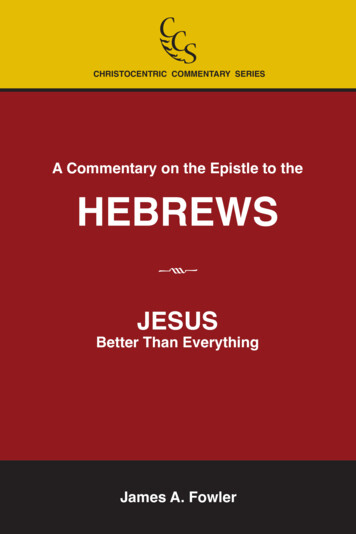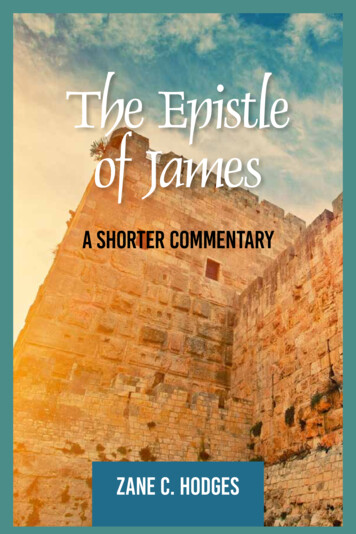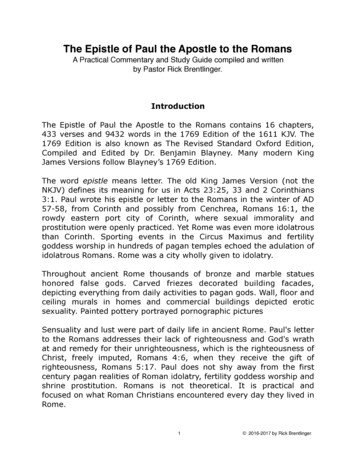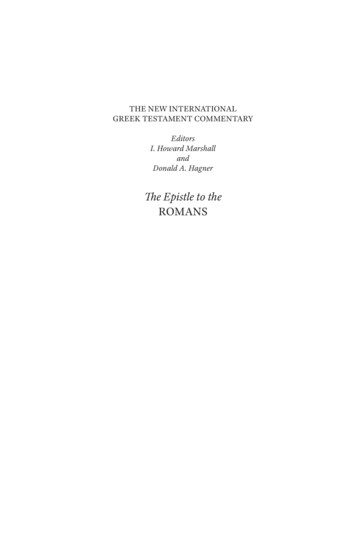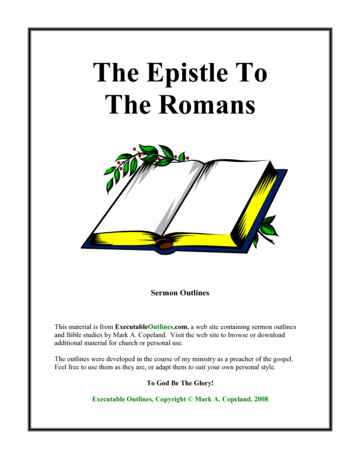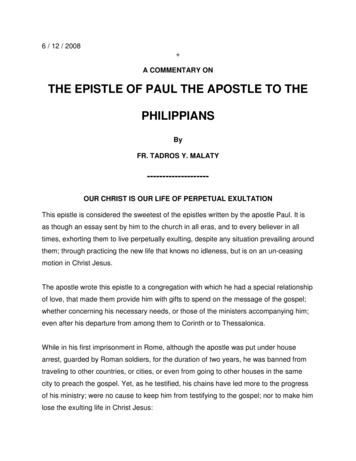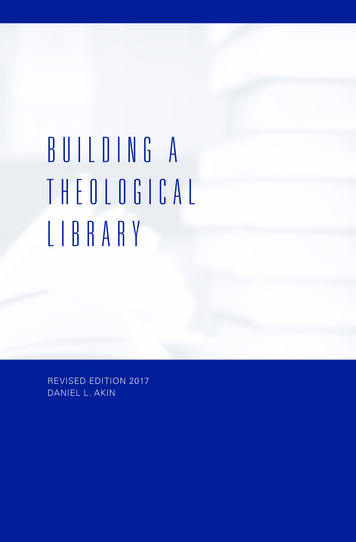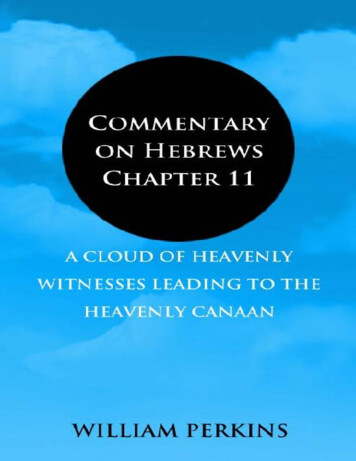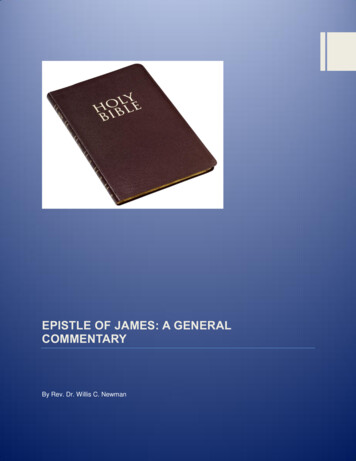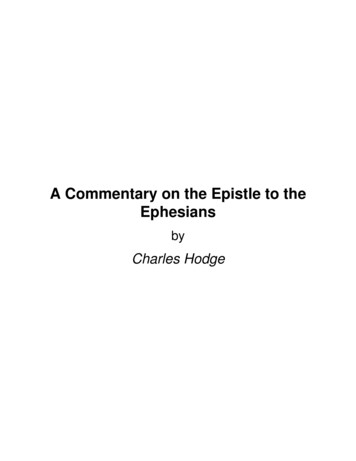
Transcription
A Commentary on the Epistle to theEphesiansbyCharles Hodge
About A Commentary on the Epistle to the Ephesians by Charles HodgeTitle:URL:Author(s):Publisher:Print Basis:Date Created:CCEL Subjects:LC Call no:LC Subjects:A Commentary on the Epistle to the htmlHodge, Charles (1797-1878)Grand Rapids, MI: Christian Classics Ethereal LibraryNew York: Robert Carter and Bros. [1860]2006-03-02All; BibleBS2695.H65The BibleNew TestamentSpecial parts of the New TestamentPauline Epistles
A Commentary on the Epistle to the EphesiansCharles HodgeTable of ContentsAbout This Book. . . . . . . . . . . . . . . . . . . . . . . . . . . . . . . . . . . . . . p. iiTitle Page. . . . . . . . . . . . . . . . . . . . . . . . . . . . . . . . . . . . . . . . . . p. 1Prefatory Material. . . . . . . . . . . . . . . . . . . . . . . . . . . . . . . . . . . . . p. 3Title. . . . . . . . . . . . . . . . . . . . . . . . . . . . . . . . . . . . . . . . . . . . . p. 3Introduction. . . . . . . . . . . . . . . . . . . . . . . . . . . . . . . . . . . . . . . . p. 3Epistle to the Ephesians. . . . . . . . . . . . . . . . . . . . . . . . . . . . . . . . . p. 14Chapter I. . . . . . . . . . . . . . . . . . . . . . . . . . . . . . . . . . . . . . . . . p. 14Chapter II. . . . . . . . . . . . . . . . . . . . . . . . . . . . . . . . . . . . . . . . . p. 47Chapter III. The Nature and Design of Paul’s Commission, vs. 1-13—HisPrayer for the Ephesians, vs. 14-21. . . . . . . . . . . . . . . . . . . . . . . . p. 76Chapter IV. An Exhortatin to Unity, vs. 1-16—An Exhortation to Holinessand to Specific Virtues, vs. 17-32. . . . . . . . . . . . . . . . . . . . . . . . . . p. 95Chapter V. Specific Exhortations, Vs. 3-20—Relative Duties of Husbandsand Wives, vs. 21-33. . . . . . . . . . . . . . . . . . . . . . . . . . . . . . . . . . p. 134Chapter VI. Relative Duties of Parents and Children and of Masters andServants, vs. 1-9—Exhortations and Directions as to the Spiritual Conflict,vs. 10-20—Concluesion, vs. 21-24. . . . . . . . . . . . . . . . . . . . . . . . . p. 168Indexes. . . . . . . . . . . . . . . . . . . . . . . . . . . . . . . . . . . . . . . . . . . . p. 189Index of Scripture References. . . . . . . . . . . . . . . . . . . . . . . . . . . . p. 189Index of Scripture Commentary. . . . . . . . . . . . . . . . . . . . . . . . . . . p. 192Greek Words and Phrases. . . . . . . . . . . . . . . . . . . . . . . . . . . . . . p. 193Latin Words and Phrases. . . . . . . . . . . . . . . . . . . . . . . . . . . . . . . p. 215German Words and Phrases. . . . . . . . . . . . . . . . . . . . . . . . . . . . . p. 218Index of Pages of the Print Edition. . . . . . . . . . . . . . . . . . . . . . . . . p. 219iii
A Commentary on the Epistle to the EphesiansCharles Hodgeiv
A Commentary on the Epistle to the EphesiansiCharles HodgeACOMMENTARYON THEEPISTLE TO THE EPHESIANS.BYCHARLES HODGE, D. D.,PROFESSOR IN THE THEOLOGICAL SEMINARY, PRINCETON, N. J.NEW YORK:ROBERT CARTER AND BROTHERS,BROADWAY.1860.iiEntered according to Act of Congress, in the year 1856,BY ROBERT CARTER & BROTHERS,In the Clerk’s Office of the District Court of the United States for the Southern District of NewYork.
A Commentary on the Epistle to the EphesiansCharles HodgeJOHN F. TROW,Printer, Stereotyper, and Electrotyper,377 & 379 Broadway,Cor. White Street, New York.iii2
A Commentary on the Epistle to the EphesiansCharles HodgeCOMMENTARYON THEEPISTLE TO THE EPHESIANS.ivvINTRODUCTION.§ I. The City of Ephesus.THE city of Ephesus, under the Romans, the capital of Proconsular Asia, was situated on aplain near the mouth of the river Cayster. It was originally a Greek colony, but became in no smalldegree orientalized by the influences which surrounded it. Being a free city, it enjoyed under theRomans to a great extent the right of self-government. Its constitution was essentially democratic.The municipal authority was vested in a Senate, and in the Assembly of the people. The γραμματεύς,"Town Clerk," or, Recorder, was an officer in charge of the archives of the city, the promulgatorof the laws, and was clothed with great authority. It was by his remonstrance the tumultuousassembly of which mention is made in Acts 19, 24-40, was induced to disperse.The city was principally celebrated for its temple of Diana. From the earliest period of its history,Ephesus was regarded as sacred to that goddess. The attributes belonging to the Grecian Diana,however, seem to have been combined with those which belonged to the Phoenician Astarte. Herimage, as revered in Ephesus, was not a product of Grecian Art, but a many-breasted, mummy-likefigure of oriental symbolism. Her famous Temple was, however, a Greek building of the Ionicorder. It had become so celebrated, that its destruction three hundred and fifty-six years before the3
A Commentary on the Epistle to the EphesiansviCharles Hodgebirth of Christ has conferred immortality on the author of the deed. All Greece and Western Asiacontributed to its restoration, which was a work of centuries. Its vast dimensions, its costly materials,its extended colonnades, the numerous statues and paintings with which it was adorned, its longaccumulated wealth, the sacred effigies of the goddess, made it one of the wonders of the world.It was this temple which gave unity to the city, and to the character of its inhabitants. Oxford inEngland is not more Oxford on account of its University, than Ephesus was Ephesus on accountof the Temple of Diana. The highest title the city could have assumed, and that which was impressedon its coins, was Νεωκόρος, Temple-sweeper,—servant of the great goddess. One of the mostlucrative occupations of the people was the manufacture of miniature representations of the temple,wrought in silver, which being carried about by travellers, or reverenced at home, found an extensivesale, both foreign and domestic.With the worship of Diana the practice of sorcery was from the earliest times connected. The"Ephesian letters," mystical monograms, used as charms or amulets, are spoken of frequently byheathen writers. Ephesus was, therefore, the chief seat of necromancy, exorcism, and all forms ofmagic arts for all Asia. The site of this once famous city is now occupied by an inconsiderablevillage called Ajaloluk, supposed by some to be a corruption of ἅγιος θεόλεγος, (pronouncedSeologos by the Greeks), the title of the apostle John, as the great teacher of the divinity of Christ.If this is so, it is a singular confirmation of the tradition which makes Ephesus the seat of St. John’slabours. Others explain the name from the Turkish, in which language the word is said to mean,City of the Moon; and then the connection is with Ephesus as the worshipper of Diana.§ II. Paul’s labours in Ephesus.In this city, the capital of Asia, renowned through the world for the temple of Diana, and forskill in sorcery and magic, the place of concourse for people from all the surrounding countries,Paul laboured for nearly three years.viiAfter remaining eighteen months in Corinth, at the conclusion of his second missionary tour,he sailed thence to Ephesus in company with Priscilla and Aquila. He left his companions there,but he himself entered into the synagogue, and reasoned with the Jews. When they desired him totarry longer with them he consented not: but bade them farewell, saying, I must by all means keepthis feast that cometh in Jerusalem; but I will return again unto you, if God will. And he sailed fromEphesus. After his departure, Apollos, "an eloquent man, and mighty in the Scriptures, came toEphesus. This man was instructed in the way of the Lord; and being fervent in the Spirit, he spakeand taught diligently the things of the Lord, knowing only the baptism of John. And he began tospeak boldly in the synagogue; whom, when Aquila and Priscilla had heard, they took him untothem, and expounded unto him the way of God more perfectly." Acts 18, 18-26.Paul, agreeably to his promise, returned to Ephesus, probably in the fall of the year 54. Herehe found certain disciples who had received only John’s baptism, to whom Paul said: " John verily4
A Commentary on the Epistle to the EphesiansCharles Hodgebaptized with the baptism of repentance, saying unto the people, that they should believe on himwhich should come after him, that is, on Christ Jesus. When they heard this they were baptized inthe name of the Lord Jesus. And when Paul had laid his hands upon them, the Holy Ghost cameupon them, and they spake with tongues and prophesied." Acts 19, 3-6.viiiIt seems from the narrative that there was in the apostolic period a class of persons who hadrenounced Judaism, and professed their faith in the person and doctrines of Christ, (for Apollos, itis said, was instructed in the way of the Lord,) and yet passed for John’s disciples, in distinctionfrom the other followers of Christ. They were Christians, for they are called " disciples," and yethad not received Christian Baptism. That is, they had been baptized with water, but not with theHoly Ghost. They may have received the inward saving influences of the Spirit, but they had notbeen made partakers of those extraordinary gifts, the power of speaking with tongues and ofprophesying, which those converted and baptized by the apostles had received. They were Christiansthrough the instructions and testimony of John the Baptist, as distinguished from those madeChristians by the preaching of the apostles. Their knowledge of the Gospel was, therefore, necessarilyimperfect. This, at least, is one answer to the question concerning the disciples of John spoken ofin Acts.After this the apostle continued for three months to attend the synagogue, "disputing andpersuading the things concerning the kingdom of God." Meeting with opposition from the Jews,he withdrew " and separated the disciples, disputing daily in the school of one Tyrannus. And thiscontinued by the space of two years, so that all they that dwelt in Asia heard the word of the LordJesus, both Jews and Greeks. And God wrought special miracles by the hands of Paul. So that fromhis body were brought unto the sick handkerchiefs, or aprons, and the diseases departed from them,and the evil spirits went out of them." Acts 19, 8-12.ixIt appears from this, and from the subsequent account given by the sacred historian, that theeffects of Paul’s preaching in Ephesus, were: 1. The conversion of a great number of the Jews andGreeks. 2. The diffusion of the knowledge of the Gospel throughout proconsular Asia. 3. Such aninfluence on the popular mind, that certain exorcists attempted to work miracles in the name of thatJesus, whom Paul’s preaching had proved to be so powerful; and that other magicians, convincedof the folly and wickedness of their arts, made public confession, and burnt their books of divinationand mystic charms. 4. Such a marked diminution of the zeal and numbers of the worshippers ofDiana, as to excite general alarm that her temple would be despised. 5. A large and flourishingchurch was there established. This is proved from the facts recorded in the twentieth chapter of theActs of the Apostles. Having spent a few months in visiting the churches in Macedonia and Greece,Paul, when he arrived at Miletus on his way to Jerusalem, sent for the elders of Ephesus, andaddressed them in terms which show that they had an important church committed to their care. Inthis address the apostle predicted that false teachers would soon rise up among them, not sparingthe flock. From the epistle to this church, in the Book of Revelation, it appears that this prediction5
A Commentary on the Epistle to the EphesiansCharles Hodgewas soon fulfilled. The church is there commended for its faith and patience, and especially for itsresistance to the inroads of heresy.§ III. The date of this Epistle and the place whence it was sent.xAs the apostle speaks of himself in this epistle as being in bonds, it is plain it was written eitherduring his imprisonment at Rome or at Cæsarea. Every thing conspires to favour the assumptionthat it was written at Rome, which until a recent period has been the universally received opinion.In the first place, it is clear that the Epistles to the Ephesians, to the Colossians, to Philemon, andto the Philippians, all belong to the same period. As to the first three, it is expressly stated that theywere sent together by Tychicus and Onesimus. Comp. Eph. 6, 21. Col. 4, 7-9. Philem. v. 12. Andthat the fourth belongs to the same period is plain, 1. Because Timothy is mentioned as being withPaul when he wrote to the Philippians, and he was with him when he wrote to the Colossians andto Philemon. 2. Because he enjoyed great liberty of preaching at the time when the Epistle to thePhilippians was written, Phil. 1, 13; and so he did when that to the Ephesians was written. Eph.6, 20. 3. Because he expresses both to the Philippians and to Philemon the expectation of beingsoon set at liberty. Phil. 2, 11. Philem. v. 22. If, therefore, one of these letters was written fromRome, they all were. But it is almost certain that the Epistle to the Philippians at least, was writtenduring his imprisonment at Rome. In ch. 1, 12, 13, he says, "The things which happened unto mehave fallen out rather unto the furtherance of the gospel; so that my bonds are manifest in all thepalace and in all other places." Even admitting that the word πραιτώριον here used, does notnecessarily refer either to the well known pretorian camp at Rome, or to the imperial palace, yet,when taken in connection with what is said in ch. 4, 22, there is little doubt that the reference is tothe place of abode of the pretorian guard in immediate attendance on the Emperor. The phrase οἱἐκ τῆς Καίσαρος οἰκίας, can only mean, those of Cæsar’s household; and as they sent their salutationsto the Philippians, there is no reasonable doubt that the Epistle to the church in Philippi was writtenat Rome. If, therefore, it was during the same imprisonment that he wrote the four epistles abovementioned, then it follows that the Epistle to the Ephesians was written from Rome.In the second place, every thing contained in the Epistles to the Ephesians, Colossians, and toPhilemon, which are admitted to belong to the same period, agrees with this assumption. 1. Thepersons mentioned in these epistles are known to have been with the apostle at Rome, but are notknown to have been with him at Cæsarea. 2. Paul, according to Acts 28, 30, 31, enjoyed liberty topreach the gospel at Rome, but it is not known that he had that liberty in Cæsarea. 3. He had atRome the prospect of being soon set at liberty, which he did not enjoy during his imprisonmentunder Felix and Festus. 4. The reasons assigned by the few modern critics who refer these epistlesto the time of his confinement at Cæsarea, have very little weight. It is said that Onesimus, a fugitiveslave, would more probably seek refuge in Cæsarea than in a place so distant as Rome; that it is tobe inferred from Eph. 6, 21, that Paul expected the Epistle to the Colossians to reach its destinationbefore the letter to the Ephesians came into their hands. This would be the case if Tychicus travelled6
A Commentary on the Epistle to the EphesiansxiCharles Hodgefrom Cæsarea, not if Rome was his point of departure. Besides, it is said, that Paul cherished thepurpose to visit Spain as soon as he obtained his liberty at Rome; whereas he wrote to Philemonthat he hoped to see him soon at Colosse; whence it is inferred that he could not have been in Romewhen he wrote that letter. The two former of these reasons have no force. If the third proves anything with regard to the date of the Epistle to Philemon, it proves the same respecting that to thePhilippians, because in that also he expresses the hope of being soon at Philippi. These expressionsonly prove that the apostle had been led to postpone the execution of the purpose which he hadformed long before of visiting Spain. There seems, therefore, to be no reason to depart from thecommonly received opinion that the Epistle to the Ephesians was written from Rome.§ IV. The persons to whom this Epistle was addressed.As to this point there are three opinions. 1. That it was addressed to the Ephesians. 2. That itwas addressed to the Laodiceans. 3. That it was a circular letter designed for all the churches inthat part of Asia Minor.In favour of the first of these opinions it is urged, 1. That the epistle is directed τοῖς οὖσιν ἐνΕφέσῳ to those who are in Ephesus. If this is the true reading, it settles the question, at least so faras this, that whatever may have been its further destination, it was primarily designed for the churchin Ephesus. That the reading above given is the true one, is proved because it is found in all extantMSS., in all the ancient versions, and in all the Fathers. This array of external evidence is decisive.No critic would venture to alter the text against these authorities. The only opposing evidence ofa critical nature is, that it appears from the comment of Basil that the words ἐν Εφέσῳ were not inthe copy which he used, and that in the MS. B. they stand in the margin and not in the text, and inMS. 67, they are inserted as a correction. This is altogether insufficient to outweigh the concurrenttestimony above mentioned. On all critical principles, therefore, the reading ἐν Εφέσῳ must bepronounced genuine.xii2. That this epistle was addressed to the Ephesians is proved by the concurrent testimony ofthe ancient church. This Basil does not question; he only explains τοῖς οὖσιν in such a way as toshow that they were not followed in his copy by the words ἐν Εφέσῳ. These two considerationswould seem to be decisive. How came the epistle to be addressed to the Ephesians, if not designedfor them? How came the whole ancient church to regard it as addressed to the church in Ephesus,if such were not the fact? It is a fundamental principle in historical criticism to allow greater weightto historical testimony than to conjectures drawn from circumstantial evidence.The objections to this view are: 1. That there is evidence that in some of the ancient MSS. nolonger extant, the words ἐν Εφέσῳ were not in the text. 2. That although Paul was personally sowell acquainted with the Ephesian Christians, 1he speaks as though he were a stranger to them andthey to him. The passages, however, cited in proof of this point, admit of an interpretation perfectly7
A Commentary on the Epistle to the EphesiansCharles Hodgeconsistent with the common hypothesis. When Paul speaks in ch. 1, 15, of having heard of theirfaith and love, he may refer to the intelligence which had reached him at Rome. And the expressionin ch. 3, 2, εἴγε ἀκούσατε does not necessarily express doubt of their knowledge of him or of hisbeing an apostle. 3. It is objected that the epistle contains no reference to the peculiar circumstancesof the Ephesians. It is so general, that it might as well be addressed to one church as another. 4. Itcontains no salutations from Paul or from his companions to any one in Ephesus. 5. It contemplatesexclusively heathen Christians, whereas the church in Ephesus was composed of both Jewish andGentile converts. The facts on which these last three arguments are founded are undoubtedly trueand very remarkable, and certainly distinguish this epistle from all others addressed by Paul toparticular churches. They prove, however, nothing more than that the apostle’s object in writingthis epistle was peculiar. They cannot be allowed to outweigh the direct critical and historicaltestimony in support of the fact that it was addressed to the Ephesians.xiiiIn favour of the hypothesis that this epistle was written to the church in Laodicea, it is urged:1. That Marcion so entitled it. But Marcion was a notorious falsifier of Scripture. 2. That in Col.4, 16, it is said, "When this epistle is read among you, cause that it be read also in the church ofthe Laodiceans, and that ye also read the epistle from Laodicea." It cannot, however, be inferredthat "the epistle from Laodicea" was an epistle which Paul wrote to Laodicea; much less that theepistle intended was the one addressed to the Ephesians. Paul may have written to the Laodiceansa letter which is no longer extant. 3. It is urged that on this hypothesis all the peculiarities of theepistle can be readily explained. But those peculiarities can be explained without resorting to ahypothesis destitute of all historical foundation.The assumption that this epistle was not designed specially for any one church, but intendedequally for all the churches in that part of Asia Minor, has met with more favour. This view, firstsuggested by Archbishop Usher, has been adopted, variously modified, by Bengel, Benson, Michælis,Eichhorn, Koppe, Hug, Flatt, Guericke, Neander, Olshausen and many others. The great objectionto it is the overwhelming authority in favour of the reading ἐν Εφέσῳ in the salutation, and theunanimous testimony of the early church. Perhaps the most probable solution of the problem is,that the epistle was written to the Ephesians and addressed to them, but being intended speciallyfor the Gentile Christians as a class, rather than for the Ephesians as a church, it was designedlythrown into such a form as to suit it to all such Christians in the neighbouring churches, to whomno doubt the apostle wished it to be communicated. This would account for the absence of anyreference to the peculiar circumstances of the saints in Ephesus. This seems to have been substantiallythe opinion of Beza, who says: Suspicor non tam ad Ephesios ipsos proprie missam epistolam,quam ad Ephesum, ut ad cæteras Asiaticas ecclesias transmitteretur.§ V. The relation between this Epistle and that to the Colossians.8
A Commentary on the Epistle to the EphesiansxivCharles HodgeThis relation is, in the first place, one of remarkable similarity. This similarity is observable,1. In the occurrence in both epistles of the same words and forms of expressions. 2. In passageswhich are identical in thought and language. 3. In passages in which the thought is the same andthe expression is varied. 4. In others where the same topic is more fully handled in the one epistlethan in the other. 5. In passages in which different topics follow each other in the same order.In the second place, although there are these striking points of resemblance between the twoepistles, there are no less striking points of difference. 1. While the Epistle to the Colossians hasevery indication of having been written to a particular congregation and in reference to their peculiarcircumstances, the absence of these features is the most marked characteristic of the Epistle to theEphesians. 2. In the Epistle to the Ephesians the doctrinal element prevails over the practical; inthe Epistle to the Colossians it is just the reverse. 3. The main object of the Epistle to the Colossiansis to warn the church against "philosophy falsely so called." Of this there is no indication in theEpistle to the Ephesians; the great design of which is to unfold the glories of the plan of redemptionas embracing both Jews and Gentiles, and designed to be the great medium for the manifestationof the grace and wisdom of God to all intelligent creatures. 4. There are, therefore, topics discussedin the one epistle, to which there is nothing to correspond in the other. 5. The order of sequence,or the concatenation of subjects, except in the case of some particular exhortations, is entirelydifferent in the two epistles. 6. The Epistle to the Ephesians has much greater unity than that to theColossians. This evidently arose from the different purposes with which they are written.In the third place, the two epistles are evidently independent the one of the other. Each is acomplete whole. In each one topic flows naturally from another, the association of ideas in everycase being clearly indicated. Neither is a patchwork, but both are a closely woven web.All these characteristics of similarity, dissimilarity, and mutual independence, are naturallyaccounted for on the assumption that the two epistles were written at the same time, the one for aparticular congregation, the other for a particular class of readers.xv§ VI. The Genuineness of the Epistle.1. The epistle announces itself as written by Paul the Apostle. 2. There is nothing in its contentsinconsistent with the assumption of his being its author. 3. All the incidental references which itcontains to the office, character and circumstances of the writer, agree with what is known to betrue concerning Paul. The writer was an apostle, an apostle of the Gentiles, a prisoner, one to whomTychicus stood in the relation of a companion and fellow-labourer. 4. The style, the doctrines, thesentiments, the spirit, the character revealed, are those of Paul. 5. The whole ancient church receivedit as genuine. As to this point the judgment of the early ages is unanimous. Even Marcion, thoughhe dissented from the common opinion as to its destination, admitted its Pauline origin. 6. Finallyand mainly, the epistle reveals itself as the work of the Holy Ghost, as clearly as the stars declaretheir maker to be God. In no portion of the Sacred Scriptures are the self-evidencing light and power9
A Commentary on the Epistle to the EphesiansCharles Hodgeof divine truth more concentrated than they are here. Had it been first discovered in the nineteenthcentury, in a forsaken monastery, it would command the faith of the whole church.xvixviiThe genuineness of this epistle, therefore, has never been doubted, except by a few moderncritics to whom nothing is sacred. These critics object: 1. That Paul was familiarly acquainted withthe Ephesians, whereas the writer of this epistle had only heard of their conversion and of theirfaith and love. This objection is fully met by showing that the expressions referred to, may beunderstood of information received by Paul, during his long imprisonment, first at Cæsarea, andafterwards at Rome; or, on the assumption that the epistle, though addressed to the Ephesians, wasdesigned for a large class of readers, with many of whom Paul had no personal acquaintance. 2.They object that this epistle is merely a verbose imitation of the Epistle to the Colossians. Nothingcan be more inconsistent with the fact. The relation between the two epistles, instead of being aground of objection against either, is a strong proof of the genuineness of both. Of this any readermay satisfy himself by a careful comparison of the two. 3. It is objected that the epistle containsno reference to the peculiar circumstances of the Ephesians, so that the address and contents areirreconcilable. This absence of specific reference, as before remarked, is accounted for from thedesign of the epistle as addressed to Gentile believers, as Christians, not as Ephesians. REUSSremarks in reference to such objections, "If Paul wrote friendly letters, these critics say they arespurious, because they are not doctrinal; and if he wrote doctrinal epistles, they say they are spurious,because not friendly." 4. It is objected that the style is not that of Paul. The very reverse, in thejudgment of the vast majority of competent readers, is the fact. There is the same fervour and forceof expression, the same length and complication in his sentences, clause linked with clause, till heis forced to stop, and begin the sentence anew. Idem in epistola, says Erasmus, Pauli fervor, eademprofunditas, idem omnino spiritus ac pectus. DE WETTE, the originator of these and similarobjections, admits that they do not justify the rejection of the epistle, which, he says, contains muchthat is worthy of the apostle, and which all antiquity acknowledged as genuine. Unfortunately,however, he afterwards retracted this admission. It is to the honour of the German critics, for whomin general, novelty is every thing, the last opinion always being the best, that with the exception ofthe destructive school of Tubingen, few, if any, of their number attach any weight to the argumentsagainst the apostolic origin of this epistle. 5. The principal objection urged by Baur of Tubingen,in addition to those suggested by De Wette, is that the Epistle to the Ephesians contains allusionsto Gnostic opinions, which did not prevail until after the apostolic age. But, in the first place, thegreat majority of scholars deny that this epistle contains any reference to Gnostic sentiments; and,in the second place, even if it did, the Epistle to the Colossians affords abundant evidence thatprinciples afterwards developed into Gnosticism, had manifested themselves in the age of theapostles. If it be said that the allusions in the Epistle to the Colossians to those principles provedthat it also is spurious; that would be only a dictum in the face of all evidence, and utterly subversiveof all history. There is no portion of the New Testament the genuineness of which the church hasfrom the beginning, with more cordial unanimity, acknowledged, than that of this epistle.10
A Commentary on the Epistle to the EphesiansCharles Hodge§ VII. Contents of the Epistle.The apostle addresses himself principally to Gentile Christians. His object was, 1. To bringthem to a just appreciation of the plan of redemption, as a scheme devised from eternity by God,for the manifestation of the glory of his grace. 2. To make them sensible of the greatness of theblessing which they enjoyed in being partakers of its benefits. 3. To lead them to enter into thespirit of the gospel as a system which ignored the distinction between Jews and Gentiles, and unitedall the members of the church in one living body destined to be brought into full conformity to theimage of Christ. 4. To induce them to live as it became a religion which had delivered them fromthe degradation of their condition as heathen, and exalted them to the dignity of the sons of Go
A Commentary on the Epistle to the Ephesians by Charles Hodge. . All; Bible. LC Call no: BS2695.H65. LC Subjects: The Bible New Testament Special parts of the New Testament Pauline Epistles. . Being a free city, it enjoyed under the Romans to a great extent the right of self-government. Its constitution was essentially democratic.
